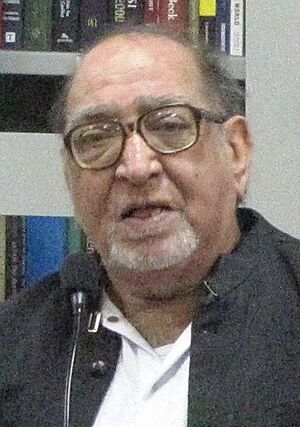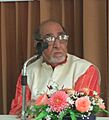Asghar Ali Engineer facts for kids
Quick facts for kids
Asghar Ali Engineer
|
|
|---|---|

Engineer in 2010
|
|
| Born | 10 March 1939 Salumbar, Kingdom of Mewar, British India (now in Rajasthan, India) |
| Died | 14 May 2013 (aged 74) Mumbai, Maharashtra, India |
| Occupation | Writer, activist |
| Notable awards | Right Livelihood Award (2004) |
| Children | 2 |
Asghar Ali Engineer (born March 10, 1939 – died May 14, 2013) was an Indian writer and activist. He worked to bring about positive changes in society.
He was known around the world for his ideas about how religion can help people gain freedom. He led a group called the Progressive Dawoodi Bohra movement. His main focus was on understanding and stopping violence between different groups in India and South Asia. He strongly believed in peace and lectured globally on how people from different backgrounds can live together in harmony.
Engineer also started and led the Indian Institute of Islamic Studies in Mumbai. He also founded the Centre for Study of Society and Secularism (CSSS). He wrote for The God Contention, a website that compares different ways of looking at the world. His life story, A Living Faith: My Quest for Peace, Harmony and Social Change, was released in 2011.
Contents
About Asghar Ali Engineer
Asghar Ali Sheikh Kurban was born on March 10, 1939, in Salumbar, Rajasthan. His father was a priest in the Bohra community. Asghar Ali learned a lot about the Qur'an (the holy book of Islam). He studied its meaning and hidden messages. He also learned about Islamic law and the sayings of the Prophet. He became fluent in the Arabic language.
He earned a degree in civil engineering from Vikram University in Ujjain. For 20 years, he worked as an engineer for the city of Mumbai. In 1965, he started writing newspaper articles. He used the name "Asghar Ali Engineer." He chose this name because "Engineer" was his job. It was common in India for people to use their job as part of their name.
Working for Change
In 1972, Engineer decided to stop working as an engineer. He wanted to focus on helping the Bohra community make important changes. He was chosen to be the main leader of The Central Board of the Dawoodi Bohra Community in 1977. Later, in 2004, he was removed from the community. This happened because he openly criticized some religious leaders.
In 1980, he started the Institute of Islamic Studies in Mumbai. This place became a platform for Muslims who wanted to see progress and change. Throughout the 1980s, he wrote a lot about how Hindus and Muslims could get along. He also wrote about the increasing violence between different religious groups in India.
Engineer played a big role in sharing the ideas of the Progressive Dawoodi Bohra movement. He did this through his writings and speeches. In 1993, he founded the 'Center for Study of Society and Secularism (CSSS)'. This center works to promote peace and understanding among different communities. He believed in freedom of speech. He did not support banning books, even if he disagreed with their content.
He wrote over 50 books and many articles for journals around the world. He was a leader in the Asian Muslim Action Network. He also directed the Institute of Islamic Studies and the Center for Study of Society and Secularism in Mumbai. He worked closely with Professor Dr Ram Puniyani. Engineer also supported the idea of having a United Nations Parliamentary Assembly. This group wants to make the United Nations more democratic.
Beliefs on Women's Rights
Engineer strongly believed that women should have equal rights. He wrote that "Women do not enjoy the status the Qur'an has given them in Muslim society today." He felt that in modern times, women should be treated the same as men.
He said that women used to accept being less powerful than men. This was because men were often the main earners for the family. But he saw that women were becoming more aware of their new place in society. Engineer believed that people who supported unfair rules, or stayed quiet when there was injustice, were not truly religious. For him, women's inequality was one of the biggest injustices to fix.
Some people said his ideas about the Qur'an were not strong enough to change how people thought about women in Islam. They felt his views were based on his own modern understanding of the Qur'an. However, his supporters noted that his ideas were deeply shaped by his desire for fairness and peace among all people.
Awards and Recognition
Asghar Ali Engineer received many awards during his life. These awards recognized his important work.
- In 1990, he received the Dalmia Award for promoting harmony between different groups.
- In 1993, the University of Calcutta gave him an honorary D.Litt. degree. This is a special degree given to honor someone's achievements.
- He received the Communal Harmony Award in 1997.
- In 2004, he won the Right Livelihood Award along with Swami Agnivesh. This award is given to people who show a strong dedication to promoting values like living together peacefully and being tolerant of others.
Images for kids
See also
 In Spanish: Asghar Ali Engineer para niños
In Spanish: Asghar Ali Engineer para niños
 | Anna J. Cooper |
 | Mary McLeod Bethune |
 | Lillie Mae Bradford |


